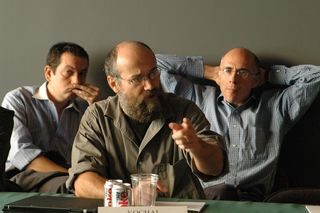Yochai Benkler on The Broadband Plan

 Yochai Benkler is one of a handful of people who our firm regards as inspirators. We've read everything he's written and find ourselves quoting him regularly in meetings. This is a picture of Yochai making a point at our first Union Square Sessions event on peer production.
Yochai Benkler is one of a handful of people who our firm regards as inspirators. We've read everything he's written and find ourselves quoting him regularly in meetings. This is a picture of Yochai making a point at our first Union Square Sessions event on peer production.
So when I came across Yochai's op-ed today in the NY TImes on the National Broadband Plan, I stopped skimming and focused, I read it twice.
Yochai agrees with many in the tech industry, me included, that we need a National Broadband Plan. But in classic Yochai fashion, he doesn't think it goes far enough. He says:
Take the commission’s “100 Squared Initiative,” which aims to get
100 megabits-per-second service to 100 million households, at
affordable rates, by 2020. Meeting the speed target shouldn’t be
difficult; industry is well on track to achieve it within the decade.Affordability
is the hard part — because there is no competition pushing down prices.
The plan acknowledges that only 15 percent of homes will have a choice
in providers, and then only between Verizon’s FiOS fiber-optic network
and the local cable company. (AT&T’s “fiber” offering is merely
souped-up DSL transmitted partly over its old copper wires, which can’t
compete at these higher speeds.) The remaining 85 percent will have no
choice at all.
This is the problem. There isn't enough competition on the access side of the Internet, both wireline and broadband. The rest of the Internet stack is hypercompetitive and is innovating at a mile a minute. But in access, we have monopolies who go at whatever speed suits them. There's nothing pushing them to go faster.
Yochai ends a fantastic op-ed with this point:
If we stay the present course, the commission’s new policy will build a
better wireless network around a more entrenched monopoly system,
lodging an insurmountable obstacle in the path toward bringing
America’s broadband network up to speed with the rest of the world.
That's a sobering thought.







